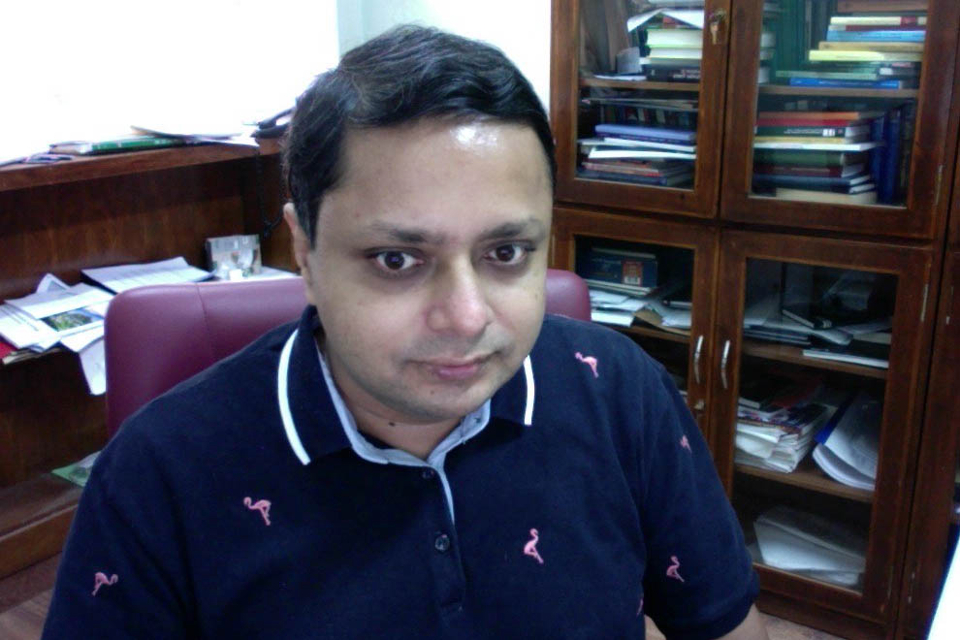PhD Alum Receives the Shanti Swarup Bhatnagar Prize, India’s Highest Science Award

January 11, 2022
Carey Slaeker | Graduate School of Arts and Sciences
Anish Ghosh PhD’06 received the 2021 Shanti Swarup Bhatnagar Prize in Mathematical Sciences in November. Named after the founding director of the Council of Scientific and Industrial Research, the Shanti Swarup Bhatnagar Prize is India’s highest science award. It’s purpose is to recognize outstanding Indian work in science and technology. Ghosh, the former student of Dmitry Kleinbock, Professor of Mathematics, is currently a faculty member at the Tata Institute of Fundamental Research (TIFR), Mumbai where he specializes in Ergodic Theory and Number Theory. We recently spoke with Ghosh and asked about the Shanti Swarup Bhatnagar Prize, his research, and advice he has for future students.
Congratulations on being one of this year’s recipients of the Shanti Swarup Bhatnagar Prize for science and technology. What makes this award special and what does it mean to you to receive it?The Shanti Swarup Bhatnagar Prize is the highest science prize in India and it is a privilege for me to have won it. I feel rewarded for my work and more importantly, the award serves as recognition for the enormous efforts of my family, teachers, mentors and co-authors.
Can you describe your research?
I work in a branch of mathematics called ergodic theory which can be loosely described as the mathematically rigorous study of chaotic systems. It originated in the study of the motion of gas molecules and has since developed into a major subject of its own. Somewhat surprisingly, it turns out that ergodic theory is closely connected to an ancient branch of mathematics called number theory. My work explores the connections between these two subjects. A guiding principle in my work is that "randomness" is a foundational feature underlying deep arithmetical problems.
What are you currently working on?
I have several ongoing projects, but one theme which I have been exploring for several years now involves the study of polynomial equations, especially integer solutions to polynomial equations and inequalities. We all know how to solve a quadratic equation but it is much more complicated to get integer solutions to such equations. Indeed, this is probably one of the most fundamental problems in number theory. I work on a class of polynomial inequalities whose study was initiated by the British mathematician A. Oppenheim. The Fields medallist and Abel prize winner G. Margulis (my academic grandfather) has made major contributions to their study. These polynomials admit certain symmetries and one can use ergodic theory to study these symmetries and ultimately the polynomials themselves.
What was your time like at Brandeis? Did you have any faculty mentors?
I had a wonderful time at Brandeis. My PhD supervisor Dmitry Kleinbock was my mentor and provided all the support and guidance that I needed. Susan Parker taught me how to teach and lent an ear whenever I had problems. The Brandeis math department was (and I am sure continues to be) an intimate, friendly and high quality department. I learned a lot from the faculty, including but not restricted to Ruth Charney, Gerry Schwarz, Fred Diamond, Ira Gessel, Kiyoshi Igusa and Danny Ruberman. In fact I learned something from each faculty member, not to mention my fellow students. Brandeis also gave me a window into the wider Boston area with its many cultural delights.
What advice do you have for students considering a graduate degree in Mathematics?
I would advise them to have an open mind and study as many different mathematical topics as they can. Also, mathematics is very difficult and constant failure is a part of every mathematician's life, so one has to accept it and plod on. Occasionally, one is rewarded with an insight into some beautiful mathematics and that makes it all worthwhile.






